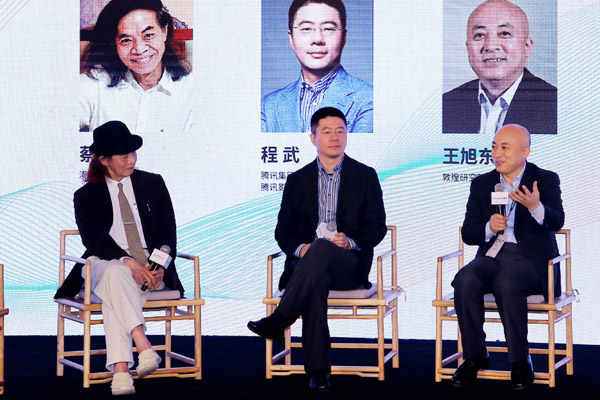 |
|
Wang Xudong (right), director of the Dunhuang Research Academy, Cheng Wu (center), vice-president of Tencent, and Taiwan cartoonist Tsai Chih-chung at the launch of a digitization project in Beijing. [Photo provided to China Daily] |
The platform will be based on a huge database complied by the academy.
The Dunhuang Research Academy launched its digitization project in 2006 to create a database to catalog high-definition images of the exquisite statues and murals. Not just for research purposes-the database was designed to help create future digital displays.
In 2014, a new visitor center at Mogao came into operation, offering a domed movie screen and virtual-reality displays of the artifacts to help guide visitors through the caves.
Another reason behind the new center was to cut the time visitors would spend inside the caves to better preserve the site and offer more exhibits as virtual displays instead.
Although the academy was initially criticized for the move, Wang considers it a necessary step to use technology to better protect the fragile earthen relics in the caves from the higher moisture and temperature levels brought by the crowds of visitors.
"And with the use of digital displays at Dunhuang, the cultural splendors of the site can be made available to millions more than the 1.7 million annual visitors to the site," Wang says. "With VR and AR, it can benefit many more people."
The new agreement will also allow Tencent to develop resources from Dunhuang into many genres of online-entertainment products, including games, cartoons and music in multiple languages.
According to Cheng Wu, vice-president of Tencent, several new roles and storylines inspired by Dunhuang will be added to King of Glory, a popular multiplayer online battle game developed by the company. And future offshoots of the game will be designed to promote Dunhuang's history and culture for game players studying in tertiary education.
Tencent began its cooperation with UNESCO in 2015 to create a digital library that included traditional games from around the world that are disappearing and revive them as online games. Many encyclopedic murals in Mogao depict scenes of people playing traditional games in ancient China, and Cheng says the project will soon cover Dunhuang to bring these murals back to life by developing them into new Tencent games.
The historical legends of the Silk Road and its ancient trade and communications routes will be used as story ideas for cartoons and animations. Tsai Chih-chung, a 70-year-old Taiwan cartoonist who is best known for his adaptation of traditional Chinese culture into comic books, was invited to be an adviser for the project.
"No one believed my comic books on Confucius or Laozi could become best-sellers until they reached the market," Tsai says. "New ways of promoting traditional culture are continually being developed, which may surprise many people."
Centuries ago, the Mogao Grottoes were publicly funded by Buddhists to show their piety. A common type of mural found in the caves are sutra paintings, which explain the content of Buddhist canons in a simpler format. Tsai compares this kind of painting to an early form of cartoons, and believes they will help with the creation of Dunhuang-themed animations.
As for the revival of ancient music, musicians will be invited to compose works based on the academic research of music scores found in manuscripts in the Mogao Grottoes. These will be broadcast on Tencent's online-music platform.
"The protection of cultural heritage in China has stepped into a new era, and this calls for new technology to give the relics more vitality," Cheng says.W